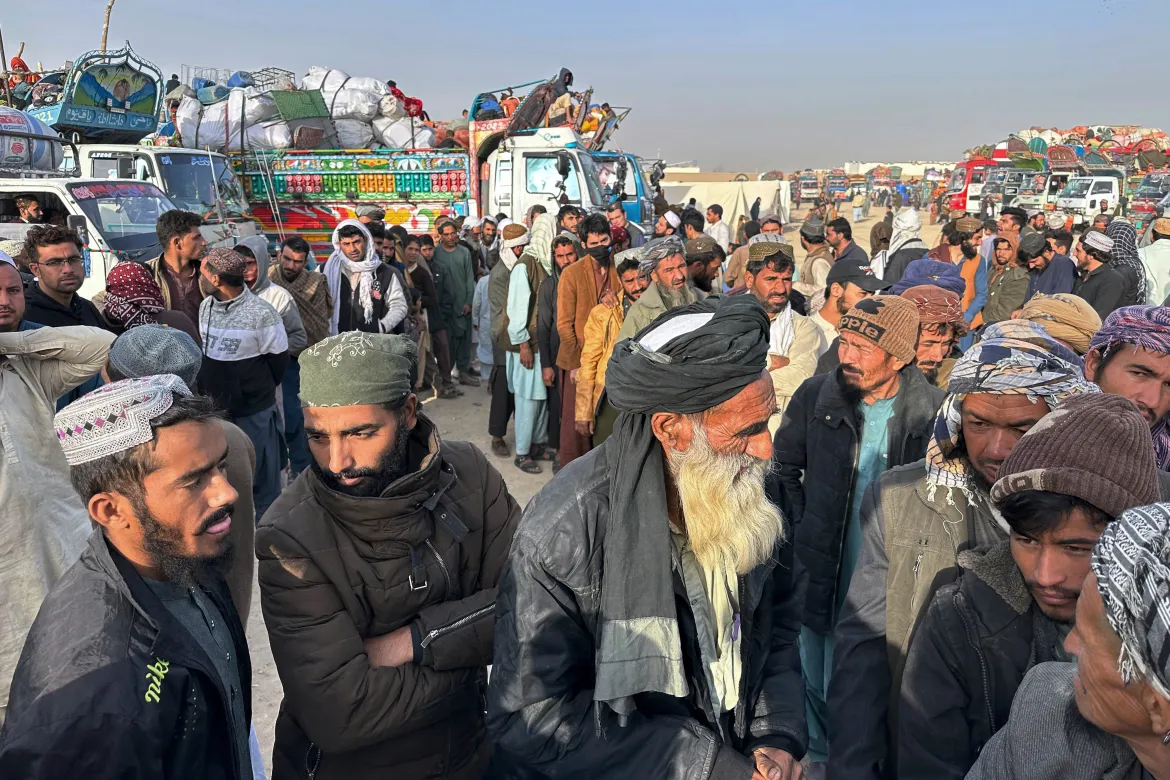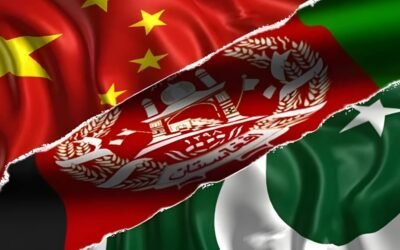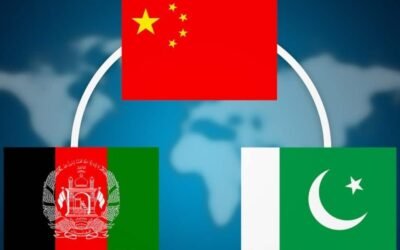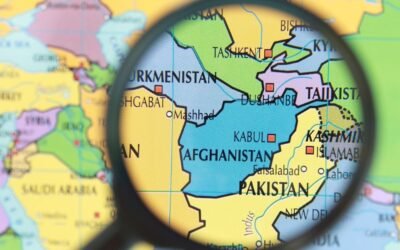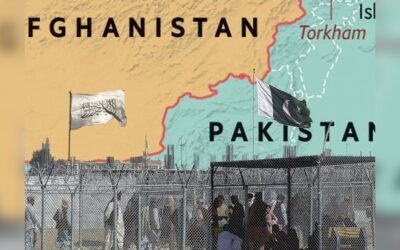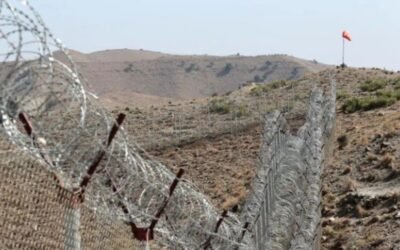Pakistan has been home to millions of Afghan refugees for decades, who have escaped war and conflict. Officials estimated that over 4 million Afghans were in Pakistan at the time, with little international support. A considerable number moved to large cities or near the border, where they were registered with the UNHCR. Meanwhile, Pakistan reiterates that it respects the Afghan people and has honored them over the decades.
Until 2023, Pakistan was estimated to have some four million registered Afghan refugees, with 1.7 million residing undocumented. In 2021, 100,000 or more undocumented Afghans arrived in Pakistan following the Taliban’s regain of Kabul. This strained Pakistan’s economy and resources.
Crackdown and Detentions in Recent Years
In the past five years, the Pakistani police and security services have conducted several crackdowns against Afghan nationals who are said to be residing in the country illegally. Starting in late 2023 and followed at a faster pace in 2024-25, crackdowns in Karachi, Islamabad, and other cities detained thousands of Afghans without valid visas or registration status. In an operation, over 1,200 Afghan men, women, and even children were detained in Karachi because they had entered the country with no valid travel documents. Even the detainees themselves were eager to return home, as indicated by Pakistani officials. Reactively, Islamabad established temporary holding camps (typically along the border camps) to hold Afghans before deporting them.

Source: AP News
According to the Pakistan Interior Minister, tens of thousands of Afghan nationals have already been repatriated. Islamabad announced that over 80,000 Afghans returned to Afghanistan by the middle of April 2025 under the IFRP. The number has since increased further: one report relied on official statistics of more than 100,000 Afghans leaving Pakistan in April alone when permits were being canceled. During the first two weeks of April 2025 alone, the International Organization for Migration (UN agency) estimated that approximately 60,000 Afghans were deported from Pakistan. The stance of Islamabad, as summarized by a spokesperson of Sindh province, is that the detainees possess no valid documentation, and upon their release, they will be deported.
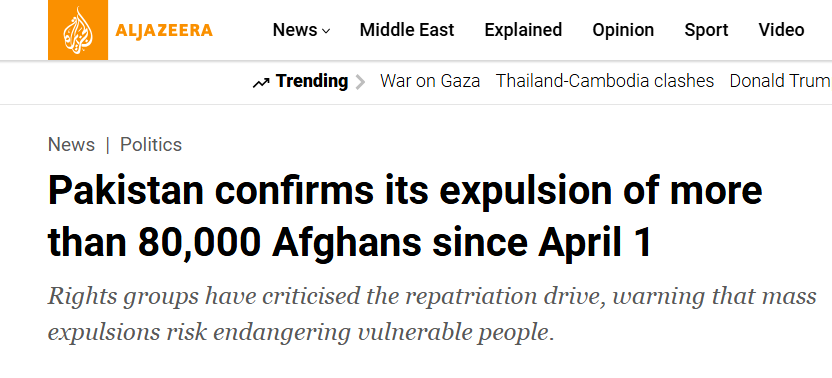
Source: Al Jazeera
Legal Framework and Repatriation Policy
The Illegal Foreigners Repatriation Plan (IFRP) emerged in late 2023 as the legal basis of the massive operation by Pakistan to deport illegal migrants, mainly Afghans. According to this policy, authorities were forced to detain and deport undocumented people. Not enshrined as official law, official notices, such as a January 2025 notice, require all undocumented Afghans to leave cities like Islamabad and Rawalpindi by March 31. Whereas registered Afghan refugees (PoR card holders) were transferred, others without documents or expired permits were immediately expelled. In a series of deadline extensions, Pakistani authorities emphasized that the policy would remain in place, citing national security and immigration control.
You May Like To Read: Pakistan’s Border Management Strategy: Are Biometric Fences Enough?
The plan is justified by Islamabad as legal and organized, stating that it does not target Afghan nationals who have legal status. According to the official, there had been sufficient warnings and chances to extend visas before the enforcement. Pakistan’s Foreign Ministry has maintained that the activity was being done humanely and diplomatically. In contrast, the Afghan embassy in Islamabad has criticized the practice of arrest and separating families of Afghanistan, citing a lack of prior notice and exposing the vulnerable population. However, Pakistan continues to insist that the drive targets only illegal immigrants.
Security Concerns and Official Position
In Islamabad, the repatriation drive is ultimately a matter of security and resources. According to Pakistani authorities, no nation can allow large groups of foreign citizens to stay illegally or destroy the immigration laws. Islamabad has openly traced aspects of the crackdown to a corresponding increase in militancy along its porous border: it argues that anti-Pakistan terrorists have sought shelter or support structures in both Afghanistan and Pakistan. According to the Interior Advisor and other authorities, the policy was only a required step to ensure stability in Pakistan, e.g., those who help in sheltering terrorists and criminals will be subjected to.
The Ministry of Foreign Affairs observes that similar immigration enforcement is applied to all illegal citizens irrespective of their nationality and that Pakistan has historically provided shelter to Afghan nationals even under difficult conditions. The argument in Islamabad is that it has already contributed to accommodating refugees, and the new policies represent a short-term but necessary change due to the unprecedented hardships.
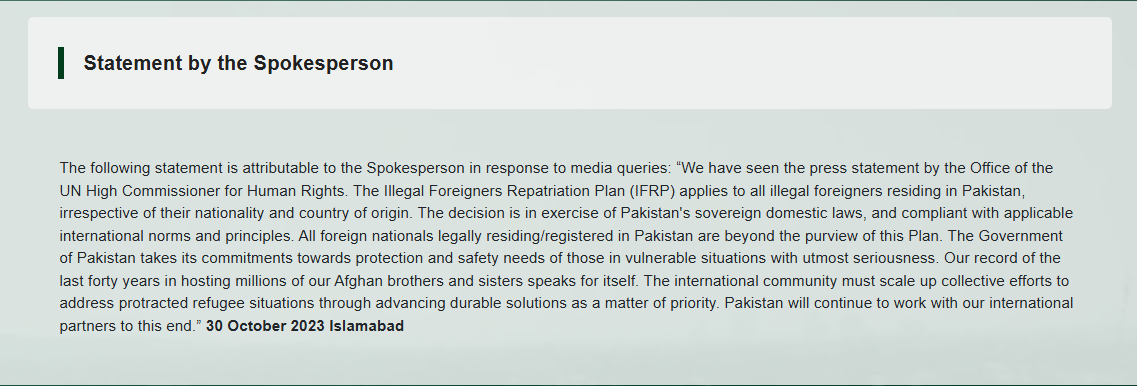
Source: MOFA
Conclusion
Pakistan claims that its repatriation policy is legal and does not violate human rights. Afghan detainees are receiving fair treatment and being deported swiftly, authorities report. Those who do not have valid documents are only being detained. Although international organizations have presented the issue as a matter of concern, Pakistan believes that the policy is essential to achieve national security. Government officials also highlight that Pakistan has been hosting millions of Afghans for decades. According to the government, it will offer support in maintaining peace and stability in Afghanistan, but it cannot neglect its borders and interests.

